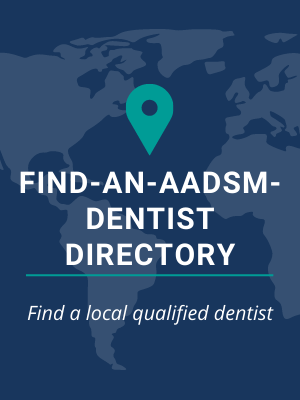OAT Patient Resources
Managing Possible Side Effects
Like most medical treatments, patients can occasionally experience side effects with OAT. The good news is that most people don’t have any discomfort with this therapy or have only minor problems that your qualified dentist can help you resolve quickly. Here are the most common things OAT patients experience and how your qualified dentist will address them:
Joint Discomfort
You may have some discomfort or pain in your jaw when you wake up in the morning as your muscles adjust to the appliance holding your lower jaw in place while you sleep. Your dentist can advise you on the best way treat this. Commonly, the dentist will suggest over the counter pain relief, jaw exercises to do each morning, or can make you a small device called a morning occlusal guide which you use after you take your oral appliance out in the morning to guide your jaw back its normal position. Most patients find they need these measures only for the beginning part of their therapy while they are getting used to it.
You may have some discomfort or pain in your jaw when you wake up in the morning as your muscles adjust to the appliance holding your lower jaw in place while you sleep. Your dentist can advise you on the best way treat this. Commonly, the dentist will suggest over the counter pain relief, jaw exercises to do each morning, or can make you a small device called a morning occlusal guide which you use after you take your oral appliance out in the morning to guide your jaw back its normal position. Most patients find they need these measures only for the beginning part of their therapy while they are getting used to it.
Irritation inside your mouth
If your oral appliance is causing problems with irritation on your tongue or inside your cheek, your dentist can make small changes to the oral appliance to make it more comfortable or may recommend you cover the irritating portion of the appliance with dental wax.
If your oral appliance is causing problems with irritation on your tongue or inside your cheek, your dentist can make small changes to the oral appliance to make it more comfortable or may recommend you cover the irritating portion of the appliance with dental wax.
Tooth movement and damage
While long term oral appliance use can cause your teeth to move, most patients find the tooth movement is so small, they don’t even notice it. It’s important to continue to see your qualified dentist for regular follow-up visits because they can adjust the oral appliance for you before it causes any problems to your teeth.
Appliance breakage
Oral appliances are made from materials that are safe to have in your mouth, but sometimes the appliance may break and a small part of the population may have allergies to the materials used. Your qualified dentist can repair any damage to your appliance and make sure it is comfortable to you to use every night while you sleep.
While long term oral appliance use can cause your teeth to move, most patients find the tooth movement is so small, they don’t even notice it. It’s important to continue to see your qualified dentist for regular follow-up visits because they can adjust the oral appliance for you before it causes any problems to your teeth.
Appliance breakage
Oral appliances are made from materials that are safe to have in your mouth, but sometimes the appliance may break and a small part of the population may have allergies to the materials used. Your qualified dentist can repair any damage to your appliance and make sure it is comfortable to you to use every night while you sleep.
Patient Jaw Exercises
Here are some simple exercises that may help with any jaw soreness or bite changes you experience with the use of your oral appliance.- Before you begin, consider applying moist heat on the affected areas for up to 10 minutes and massaging your cheeks and temples, as it helps improve blood flow to the muscles.
- When doing these exercises, move your jaw far enough to feel the muscle stretch, but avoid any movements that increase pain or soreness.
- You may perform these at any time of day.
- Contact your dentist if symptoms persist or pain increases.

